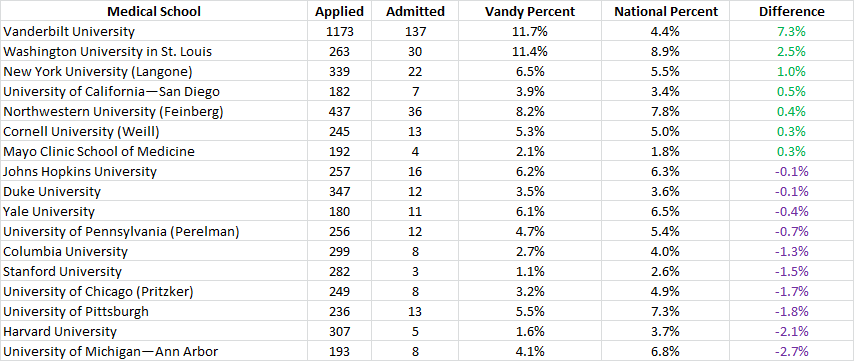- Joined
- Apr 6, 2014
- Messages
- 14,146
- Reaction score
- 22,793
One of the common topics here on SDN is the role that your undergrad's reputation might play in medical admissions, particularly when gunning for admits at "top 20" medical schools.
There's a pretty convincing case to be made that a bias exists - for example see Lucca's much more thorough post about the class compositions over recent years at Yale SOM (tl;dr: ~75% of matriculants are supplied by just the "top 20" universities and LACs). Or, take a gander at the AAMC survey of medical adcoms a few years back, which found that private med schools rated "selectivity of undergrad" as a high-importance academic metric.
But what happens if we approach the question from the other direction: looking at how successful the pre-med graduates of a selective college are at getting admitted to "top 20" MD programs?
Normally, this data is provided by the AAMC to each undergrad in a "Designated Medical School Aggregate Report" and is not accessible to the public. Luckily for us, the Vanderbilt pre-med advising office publishes their report each year (example here).
From there, it's very straightforward to tally up the number of Vandy applications and Vandy admits to each "top 20" medical program. I did this for the 6 cycles spanning 2011-2016.
So, here are the values, Vandy-specific accept rates, and national accept rates at the current "top 20" medical programs*:

There was one thing that did not surprise me: Vandy SOM inbreeds a lot, with an admit rate that is nearly tripled for applicants from their own undergrad.
What did surprise me was the rest: there was not a big boost in success rates for Vandy premeds elsewhere, in fact most of the time they were almost identical or worse than the nation.
Vanderbilt is certainly a "selective undergrad," with admit rate and test scores similar to Ivies. It's also a major feeder into medical schools, similar to places like Stanford and Harvard and Brown with approx. 15% of the student body (~280 people) applying each year. The average MCAT scores are high compared to the nation (511 / 85th percentile) and overall MD admit rate is much higher (70% admitted).
And yet, TL;DR - the data does not seem to support the idea that Vandy premeds have a leg up within "top 20" MD admissions.
I could speculate a bunch on why this might be the case, but won't make this text wall any longer.
*You might notice some programs missing, like UCLA, UCSF, or U of Washington. That's because there wasn't really any data - across all 6 years, 0 or 1 person got in.
**Almost every school had a year with zero Vandy admits. For example in 2015, no Vandy premeds got into Hopkins or Penn. Since the schools did not appear in the report in these cases, I marked down 0 admits but had to estimate the number of applicants by averaging the other years.
There's a pretty convincing case to be made that a bias exists - for example see Lucca's much more thorough post about the class compositions over recent years at Yale SOM (tl;dr: ~75% of matriculants are supplied by just the "top 20" universities and LACs). Or, take a gander at the AAMC survey of medical adcoms a few years back, which found that private med schools rated "selectivity of undergrad" as a high-importance academic metric.
But what happens if we approach the question from the other direction: looking at how successful the pre-med graduates of a selective college are at getting admitted to "top 20" MD programs?
Normally, this data is provided by the AAMC to each undergrad in a "Designated Medical School Aggregate Report" and is not accessible to the public. Luckily for us, the Vanderbilt pre-med advising office publishes their report each year (example here).
From there, it's very straightforward to tally up the number of Vandy applications and Vandy admits to each "top 20" medical program. I did this for the 6 cycles spanning 2011-2016.
So, here are the values, Vandy-specific accept rates, and national accept rates at the current "top 20" medical programs*:

There was one thing that did not surprise me: Vandy SOM inbreeds a lot, with an admit rate that is nearly tripled for applicants from their own undergrad.
What did surprise me was the rest: there was not a big boost in success rates for Vandy premeds elsewhere, in fact most of the time they were almost identical or worse than the nation.
Vanderbilt is certainly a "selective undergrad," with admit rate and test scores similar to Ivies. It's also a major feeder into medical schools, similar to places like Stanford and Harvard and Brown with approx. 15% of the student body (~280 people) applying each year. The average MCAT scores are high compared to the nation (511 / 85th percentile) and overall MD admit rate is much higher (70% admitted).
And yet, TL;DR - the data does not seem to support the idea that Vandy premeds have a leg up within "top 20" MD admissions.
I could speculate a bunch on why this might be the case, but won't make this text wall any longer.
*You might notice some programs missing, like UCLA, UCSF, or U of Washington. That's because there wasn't really any data - across all 6 years, 0 or 1 person got in.
**Almost every school had a year with zero Vandy admits. For example in 2015, no Vandy premeds got into Hopkins or Penn. Since the schools did not appear in the report in these cases, I marked down 0 admits but had to estimate the number of applicants by averaging the other years.
